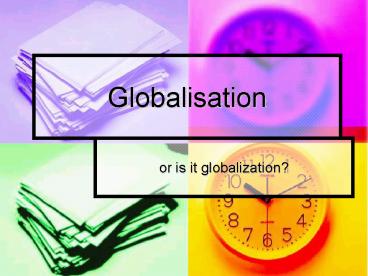Globalisation - PowerPoint PPT Presentation
1 / 12
Title:
Globalisation
Description:
Leads to higher employment, therefore greater prosperity. Globalisation can help spread international awareness ... Vandana Shiva, Indian Scholar and Activist ... – PowerPoint PPT presentation
Number of Views:44
Avg rating:3.0/5.0
Title: Globalisation
1
Globalisation
- or is it globalization?
2
What is Globalisation?
- The rapid increase in cross-border economic,
social and technological exchange under the
conditions of capitalism - To make global or worldwide in scope or
application.
3
Pros
- Leads to higher employment, therefore greater
prosperity - Globalisation can help spread international
awareness of health, business skills and human
rights - The gap between the richer and poorer countries
is narrowing - e.g. America/China - in 1980
Americans earned 12.5 times as much as the
Chinese. By 1999 it had lowered to 7.4 times. - Small firms employing less than 200 people
account for between 10 and 25 of exports
4
Pros
- Increases job opportunities in developing
countries - Forms of globalisation such as the internet can
help promote traditional cultures - W.T.O rules do not allow items to be blocked
(such as films, lifestyle products) to be banned
because on cultural grounds, creating equality
between races and lifestyles - W.T.O rules expressly permit countries to take
actions to protect human, animal or plant life or
health, and to conserve exhaustible natural
resources
5
Cons
- The profits would still go to the same people at
the top of the big firms, thus widening the gap
between extremities in the rich and poor. - If one part of the worlds economy, e.g. the US,
was to slow down, there would be a decrease in
output from other companies abroad because of a
decrease in demand. - Individual countries can risk isolation if they
do not allow global companies into the country. - The inter-linking of national economies has
brought global instability - America is seen as leading the globalisation
campaign we eat American foods, drink American
drinks, watch American TV, and speak English -
thus leading to a decline separate countrys
cultural identity.
6
Cons
- Transnational companies want to place
environmentally degrading industries in countries
that do not have adequate environmental controls. - industries such as forestry, mining and fisheries
exploit the resources of poor countries with
little regard to the long term cost to the
country in terms of the loss of a national
resource, or to the environment. - Processes of industrialisation are leading to
global warming and a deterioration of atmospheric
quality. Developing countries have been excluded
from the Kyoto Protocol, providing a loophole for
transnational companies - they can go there
instead of their own company
7
CASE STUDY - NESTLE
- Nestle are one of the largest global companies on
the planet with a global market which stretches
to nearly every country in the world.
8
(No Transcript)
9
Good Food, Good Life
10
(No Transcript)
11
This mother was told she would not be able to
breastfeed both her children. The twin on the
right was fed with Nestle Infant Formula. The
child died.
12
The future is possible for humans and other
species only if the principals of competition,
organised greed commodification of all life,
monocultures, monopolies and centralised global
corporate control of our daily lives enshrined in
the WTO are replaced by principles of protection
of people and nature, the obligation of giving
and sharing diversity, decentralisation and self
organisation enshrined in our diverse cultures
and national constitutions. Vandana Shiva,
Indian Scholar and Activist































